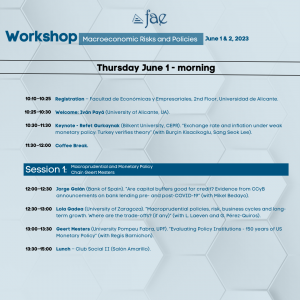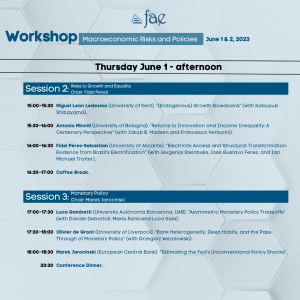The UA brings together academics and members of European central banks to address the main risks faced by the economy.
On the 1st and 2nd of June, the Department of Foundations of Economic Analysis (FAE) of the University of Alicante will welcome European experts and academics, as well as members of different central banks. At the different sessions of the Workshop “Macroeconomic risks and policies”, they will address the main challenges and risks faced by the Spanish economy and the international community.
The approach of FAE is a “workshop” that brings together notable economic thinkers who will try to analyse key issues for the economy, such as Climate Change, green taxation policies and the transition model imposed by decarbonisation of the economy, as well as matters related with social inequality, low productivity, energy prices, the impact of public debt, financial instability, macroeconomic policies fostering economic growth, and measures to achieve price stability.
The director and coordinator of this event, Iván Payá, has indicated “the importance of this Workshop which includes renowned, top-level professionals. We will have a panel of experts who can inform civil society, our productive fabric and policymakers on issues which will affect our economy, and thus, the future prospects of European society in the short and medium term.”
In this regard, Iván will address the link between public debt sustainability and the consequences of financial crises. His study suggests that vulnerabilities in the public finances make future economic and financial crises more severe and followed, with a greater likelihood, by sovereign debt crises such as the one experienced by the euro in the past decade.
Presentations on Green Taxation and the example of the monetary policy in Turkey
The coordinator of the workshop highlighted the presentations that will be given by Evi Papa and Refet Gurkaynak who are reputed researchers at prestigious universities and collaborators in central banks around the world.
Evi Pappa (Carlos III University – Madrid), who has acted as a researcher and consultant for the central banks of Spain, Canada, England and the European Central Bank, will give the presentation “The green metamorphosis of an economy”. This work analyses the transition toward the green economy imposed by Climate Change and the increase in the cost of conventional energy. Pappa has analysed the economic impact of the transformation process imposed by decarbonisation, as well as the effects of the green taxation policy which attempts to foster this transformation in an economy such as that of Spain.
In turn, Refet Gurkaynak (Bilkent University – Ankara), who was an economist in the Monetary Affairs Division of the US Federal Reserve, will present the example of Turkey as a case to demonstrate the effects of implementing macroeconomic policies that ignore basic macroeconomic theory, as did the latest Turkish government. This policy has led to high inflation and devaluation of its currency.
Workshop
The workshop is structured in five sessions spread over two days under the headings of “Monetary Policy”, “Risks to growth and equality”, “Macroprudential and monetary policies”, “Structural macroeconomics” and “Climate risks and risks of sustainable debt”.
Participating in the different sessions of this workshop, which will be held in the Conference Hall of the Faculty of Economics and Business of the UA, among others, will be Marek Jarocinski of the European Central Bank; Jorge Galán of the Bank of Spain; Luca Gambetti, Universidad Autonoma Barcelona; Antonio Minniti, University of Bologna; Krisztina Molnar, Norwegian School of Economics; Stefano Soccorsi, Lancaster University; Lola Gadea, University of Zaragoza; Fidel Pérez Sebastián, University of Alicante; Olivier de Groot, University of Liverpool; Miguel León-Ledesma, University of Kent; Geert Mesters, Pompeu Fabra University; Francesca Monti, Catholic University of Louvain; Maik Wolters, Kiel University; and Spyridon Lazarakis, Lancaster University

 Español
Español Valencià
Valencià

